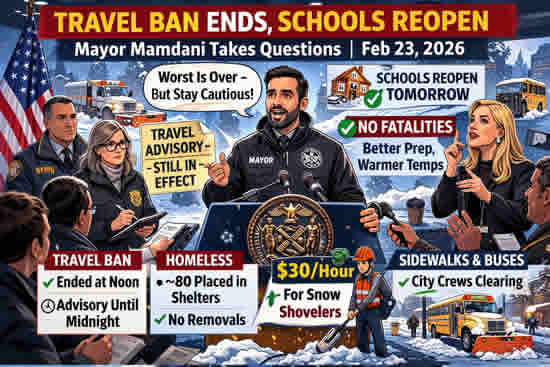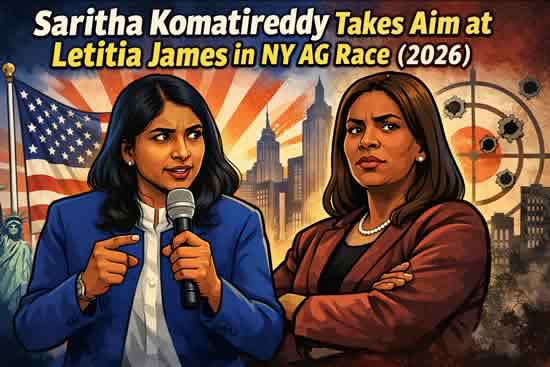
In a lively interview on 77 WABC’s “Sid & Friends in the Morning,” New York City Mayor Eric Adams addressed his administration’s successes, including record-breaking housing construction, historic job growth, and significant crime reductions, with the subway system safer than ever. He highlighted managing the migrant crisis, with 90% of migrants no longer in city care, and emphasized his commitment to public safety and working-class New Yorkers. Despite frustrations with media coverage and low poll numbers, Adams remains confident, focusing on direct voter engagement as the election nears. He defended NYC’s sanctuary city status while advocating for federal cooperation to deport criminals, distancing himself from policies that harm the city, and expressed optimism about continuing the city’s recovery.
Transcript: Mayor Adams Appears Live on 77 WABC’s “Sid & Friends in the Morning”
August 13, 2025
Sid Rosenberg: In New York Minute, if anybody could appreciate what happens in a New York Minute, it’s the man sitting in front of me right now, and we didn’t talk for a long– it’s my fault– we didn’t talk for a long time, but you guys know that I went to Gracie Mansion on Friday, and the mayor, Eric Adams, was a good guy, was kind enough to meet with me, even though he heard me say some rough stuff, and we had a really good conversation, and now, five days later, he’s in my studio, so we go from not talking for a year and a half, and now we’re together twice in five days, so, I guess I’m going to Vegas next, right? How are you, Mr. Mayor?
Mayor Eric Adams: And what happens in Vegas stays in Vegas.
Rosenberg: But not in New York, and you’ve got the great Kayla Mamelak Altus here, who used to interview me about Phil Jackson on Channel 5 years ago, isn’t she great at her job? She’s great, right?
Mayor Adams: Yes, she is amazing, really understands the pulse of the city, and just an authentic New Yorker, with her two beautiful children. Back when she interviewed you on Phil Jackson, she didn’t have her two children.
Rosenberg: I think she had just gotten married, now that you say that, you’re right, Eric, you’re right. She’s very loyal to you, she loves you. Alright, we’ve got a whole bunch of stuff to get to, and you’ve got to run a city, so you’ve got to go, I’m sure, at some point.
The new polls came out yesterday, and they’re not good, but you said to me on Friday, and I agree with you, that the election starts five weeks out, okay? What’s happening in July, they’re on the Hamptons, on Fire Island in August, doesn’t really tell the whole story. So, it’s really a two-part question, yes, I agree with you, it’s five weeks out. This is a pretty low number. Are you dejected? Or are you still sticking with, hey, I’ll worry about this in October?
Mayor Adams: No, it’s not about worrying about it in October, you build your foundation. Think about it. The Democratic primary winner, at this time, away from the primary, he was one percent in the poll. One percent.
Rosenberg: Here’s the difference, though. You’re a well-known name already, like, he came out of nowhere. You’re a commodity. People know who you are. They know what you can do and what you can’t do, so I hear you, but to compare yourself to a guy that came out of nowhere, no one knew who he was, I’m not sure it’s a great comparison. Does that make sense?
Mayor Adams: No, no, it doesn’t. But people know the name Eric Adams. They know the name, mayor, but let’s be real honest, you’re a good observer of what happens in the city. Has my story ever been told? Do people know that I build more housing in year one, two, and three in the history of the city? Do they know that low-income New Yorkers pay no income tax anymore?
Do they know the story of how we broke the records of jobs in this city? So what am I saying? I’m saying campaign times allowed you to get over the daily coverage and speak directly to voters. My son sat down with me one day, we had a meal, and when I started telling him what we have done in the city, he said, Dad, I didn’t know that. I can’t tell you how many times people say, I didn’t realize what you’ve done in the city, so now they’re going to get to know me and not just hear through a soundbite. You’re pissed about that.
Rosenberg: You said a couple of weeks ago that you felt like you were being, it wasn’t right, that the media doesn’t give you credit, and you’re like, hey, they’re quick to talk about the stuff that’s not going great, but what about the stuff that is going good?
You sound like Trump, actually. You know, the media’s all over me. I’m being serious. I told you that three years ago at Michael’s, you sound like Trump. But you’re pissed about that, aren’t you? No, pissed is not the right word.
Mayor Adams: Frustrated? Yes, yes. I think that’s a better word. What I inherited, I inherited a city with jobs, leaving the city, crime was up, I’m sure you were not learning at the level that they deserve. We had COVID, 237,000 migrants and asylum seekers, tourism was decimated, and look at where we are now. There’s a complete turnaround.
That’s why bond rates increased my bond rating. I managed the migrants and asylum seekers, 90 percent of those migrants and asylum seekers are no longer in our care. The last six months, first six months of this year, lowest numbers of shootings, homicides, people being shot in the history of the city, and we still see that success, even on the subway system.
Our subway system is the safest in recorded history when you move to two months of COVID. So the story has not been told of this great recovery of the city. That’s because Mike Kemper does such a great job.
Rosenberg: I love Mike.
Mayor Adams: I love Mike also.
Rosenberg: At the Yankee game on Monday night, when you talk about the illegals, okay, and here’s what the conversation is going to get, Frank, okay, you were there, Eric, at the beginning, right there outside the buses, welcoming these people to New York, giving them all kinds of beautiful things, five-star hotels, meals, all kinds of cool stuff. You know, you were, hey, we’re the sanctuary city, come here.
So yes, eventually you got to the point where you couldn’t handle it anymore. The city couldn’t handle it, but let’s be honest, you weren’t against it for a long time. In fact, if anything, you kind of contributed to all those people being here. Is that not fair to say?
Mayor Adams: No, no, it’s not. I’m no different than the Statue of Liberty. That’s the same. You know, the Statue of Liberty yesterday said to our immigrants, bring us your tired, your sick, your hungry. I mean, that is who we are.
Rosenberg: Bring it legally, sure.
Mayor Adams: Right. That’s who we are. And that was always against bringing people in the city without the resources of coming here. And so when I met a bus, I was meeting a bus in the spirit of who we always have been as a city of immigrants. I don’t care if it’s the Caribbean diaspora, if it’s Irish, if it’s Italians, but when you came here historically, you were able to come here and work and provide for yourself.
You were able to be part of the American experience. I don’t control who comes across the border, but once you’re in this city, I’m sure you’re safe, that children are educated, and that you are provided with an opportunity to participate in the American dream.
Rosenberg: So why didn’t that continue? If it was all about that, and I buy that, you’re right, if it was all about that, why did it stop? Why did you get angry all of a sudden? About the money? It was about the way Joe Biden was treating you, the indictments? Why all of a sudden did it go from that, hey, we’re that type of city, everybody comes, you’re all welcome, to, I don’t want them. I don’t want them, that’s it? Is it because you couldn’t handle them anymore? What was the issue?
Mayor Adams: That’s not my tone now, “I don’t want them.” I don’t have that tone. I want anyone in this city that is going to contribute to the city. During COVID, it was our undocumented that was out in the street delivering our Uber Eats, delivering our foods, working for us.
It is the immigrant community that built our bridges, our tunnels, our roadway. What I want to be clear on, and I’ve always stated this, I have not changed, those who commit crimes don’t have a place in this city. Like when we took down the illegal gang that was 27 gang members that were forcing undocumented women into prostitution.
We would never tolerate that and never accept that. But this is a city that we state, you come here, you have an opportunity to pursue the American dream. Now, many people say, well, you’re a sanctuary city. Let’s be clear on what that means. That’s not a law. A lot of people think it’s a law, it’s not.
What it says is, when a person walks into a store, buys a loaf of bread, they pay taxes. Those taxes allow you to get the goods and services of the city. That means your child can go to school and be educated. That means that if you are a victim of a crime, police will come and assist you, as well as hospitalization if you need it. That’s what it means. It does not mean that if you’re here to break a law, that you should be able to stay in our city.
Rosenberg: So, are you still interested in shedding that sanctuary city from this? I think you went to court at one point, correct me if I’m wrong, because you were interested in maybe doing that, or is that not?
Mayor Adams: No, here’s what I’m interested in doing. That when we have someone who commits a crime like the person who shot the custom border patrol agent, when you have someone like that, we should be able to coordinate with our federal partners to have that person convicted, serve his time, and leave this country. That’s what I believe in. But if you are someone that came from one of our various countries, legally vetted, came across the border…
Rosenberg: But they’re not. They’re not [here] legally, and they’re not vetted.
Mayor Adams: And I agree. That should not happen. But remember who has authorization to do that? The federal government. Mayors don’t have that authorization to do that. Mayors have the obligation to take care of those who are innocent. Let me give you a perfect example, Sid. When I was a rookie cop, I was patrolling, I was off-duty in Chinatown, I heard a man scream, turned out to be a Chinese immigrant, undocumented person, came to his assist, he was being robbed.
He was afraid to talk to the police because he thought he was going to be deported. People prey on those who are not willing to go to serve, receive the services from the city because of their documentation. If you create that environment, my children are staying home from school. That’s dangerous. Our emergency rooms will be overrun for those who don’t get medical attention. And those will be preyed on by individuals who want to prey on those who are undocumented. That’s chaos in our city, and I can’t have that in our city.
Rosenberg: Mayor Eric Adams, so you’re still there, Tom Homan, Kristi Noem, you’re still on board, right? I know these other officials in this town give you a lot of hell, they give you a lot of hell. You have no issue putting, you know, Rikers Island, all that type of stuff. You’re still with Homan, Noem, and Trump on that, right?
Mayor Adams: This is where I am. ICE, who you hear about a lot, ICE is not a criminal organization, it’s a law enforcement organization. ICE is a federal law enforcement organization, HSI, and our other federal partners.
We should always coordinate with federal authorities for those who commit crimes. Now, the city law does not allow me to coordinate when it comes down to just civil immigration or deportation. We can’t do that. We can’t break the law to carry out the law. But I will always coordinate with my federal partners to deal with criminal actions.
Rosenberg: Some of your detractors say, you know, the truth is with the mayor that he’s doing all this stuff now because he owes Trump. Like Trump, you know, got him off a bad deal, depending upon who you talk to. There were some that think it was a lot worse than you presented, a lot worse for the president. And there were some that say, to be honest, there wasn’t much there.
Either way, it doesn’t matter. You would admit President Trump helped you. So now you feel like you have to pay him back in a certain respect. What is the real relationship between you and Trump? Do you talk every day? Do you talk weekly? Do you talk monthly? Where is the real relationship between Adams and Trump?
Mayor Adams: Well, first, I want to thank the president for what he did on the campaign trail. He was on the campaign trail. I didn’t know the president. We never met. We both live in the same city, but we never met each other. We both grew up in Queens, but we never met.
Rosenberg: Were you from Queens?
Mayor Adams: Yes.
Rosenberg: I didn’t know that. What part?
Mayor Adams: I grew up in Queens. I was born in Brownsville, South Jamaica, Queens.
Rosenberg: Where did you grow up in Queens?
Mayor Adams: I went to Bayside High School. Oh, you did? ISA, PS 140. My childhood was in Queens, but I returned to Brooklyn when I became the board president. But speaking of the president, the president was on the campaign trail, and remember, not knowing each other, and said, look at what they did to that mayor in New York.
He raised the attention, and people started to take notice of how unfair I was being treated. Sid, I was indicted for calling the Fire Department commissioner and asking him to do a building inspection. A building inspection.
Rosenberg: Is that why you were indicted, or the money?
Mayor Adams: No, I’m saying that that was the reason they said for the indictment. And then in addition to that, there was a volunteer, not an employee, not a staffer, there was a volunteer in our campaign that appeared to have done something inappropriate. And anyone that knows how this goes, the question becomes, either you say Eric told you to do it, or you have to live by it, die by it.
What happens when people get in those situations? There was no evidence that showed I told anyone to do anything inappropriate. In fact, there were text messages of me saying, you gotta follow the rules and follow the law. That’s what happened. And so when the president raised this on the campaign trail, and then when he got elected, his Justice Department looked at it again and made a decision on that this case should be dismissed.
The same way– what happened with Brian Benjamin. Brian Benjamin, the highest ranking African American in the state, brought up one of federal charges. The judge dismissed that case. And when you look at these cases, the main justice has the right to determine if cases should be dismissed.
Rosenberg: Do you want President Trump’s endorsement?
Mayor Adams: I want New Yorkers’ endorsement. I think the president’s going to make a determination on what he’s going to do in his race.
Rosenberg: Would you be disappointed if he endorsed somebody else?
Mayor Adams: No, I would not. No, I would not. People make their decisions on who they want to endorse. You see endorsements, those are all throughout the city. My job is to connect with voters. The president, as in previous presidents, there has been relationships of delivering for the city. I must deliver for the city.
The president did an unbelievable role in lifting the stop work order on a multi-billion dollar project that happened in Sunset Park, 1,500 union jobs, able to power 500,000 homes, and being able to go to Washington to speak with him and ask the president to lift the stop work order was a real win. That’s what mayors are supposed to do. So I don’t join the other mayors who say they want to go to war with Washington. No, I want to work with Washington to deliver for the City of New York.
Rosenberg: Eric, there’s money. We need money. The federal government gives us money. You got to be a moron to fight the president. Let’s be honest. Let’s put it right down to the bottom. Money. By the way, you’ve got Governor Paterson’s endorsement. You’re good, like that’s it.
Mayor Adams: I’m seeing Governor Paterson today and Governor Paterson is going to join us and we’re looking forward to having him be a part of the campaign.
Rosenberg: One of my favorite people in the world. We just went to the Yankees game together Monday night. A great guy. This is the mayor, Eric Adams. So you know I was angry with you because I felt like you didn’t do enough those 18 months when it was really scary here, okay?
When my wife, you know Danielle well, and my kids were going, I don’t want you to go to work. Don’t go into the city. Back then I even called Eddie Caban myself. He was the commissioner and said, please have a couple of cops standing outside. They want to kill me. Global jihad days. They still are. There was all brand new, you know, people yelling on the subways, thousands of people walking up and down the streets.
I’m at Columbia. You’re not. I didn’t see a lot of you. And I got angry. I said, where the hell is Eric? He loves the Jews. He’s great with the Jews. But for about 18 months, I was pissed. I was pissed. But, we spoke about this on Friday, and you brought up a pretty good point. You said, well, let me ask you this. All the politicians, all the people in New York City, does anybody else do more for the Jewish people?
Does anybody else say more? Now look, what I said to you was, that’s like winning a beauty contest in a [inaudible]. That doesn’t mean you did great because the rest suck, to be completely honest. But, compared to them, yes. So when I say I was disappointed, you say what? I was angry actually. You say what?
Mayor Adams: No, and I think it’s not that I did great in comparison to everyone else. I did great because I did great. I was in the streets at some of these demonstrations in March, communicating with our commanders and telling them what my expectations were.
When we had to make arrests, we made arrests. When people told me, don’t do the Israeli Day parade because it would be too dangerous, I said, that’s not acceptable. And we would not run for fear and we’re not going to have anyone disrupt our life here in the city. So not only the Israeli Day parade, but also there were times, I went up to Columbia, I went up to NYU. We communicated with the school officials and told them we should be moving in right away to disband the encampments, to disband the actions of those who were in the protests.
Rosenberg: Yes, and this is the one time I actually did yell at you on Friday, when I said to you, you may have done all that okay, but let’s be honest Eric, if the KKK was on that lawn and they were terrorizing Black students, okay, that’s a trick of a Black guy. They were terrorizing Black students and it wasn’t Hamas terrorizing Jews. You will never be able to convince me, even now you’re not going to be able to. You were going to wait for a call from the president to go in there. You would have gone in there with guns blazing if the KKK was terrorizing Black students.
Mayor Adams: No I would not.
Rosenberg: Come on. Eric. Come on.
Mayor Adams: I want to be very clear about something that people, I really want your listeners and New Yorkers to know. There are things in this country that they get me angry, frustrated. I get angry when I see people commit crimes from right outside the prisons automatically.
I get angry when someone shoplifts 50, 60, 100 times and they get a slap on the wrist. I get angry when I see people walking through the street calling for not only the destruction of Jews but the destruction of America. That angers me.
But I believe in what this country stands for and that’s law and order. Every time somebody tells me to violate that I think about a 19 year old young man that didn’t like what was happening in this country but he went to Vietnam anyway and he lost his life.
And that’s my uncle, my uncle Joe and I think about him all the time. I believe in what this country stands for and this country states, you may not like what someone is doing in the street marching, but here you have a right to do that. But when you cross the line we’re going to take action and we did that. We took action every time someone crossed the line in this city.
Rosenberg: Well you’re not going to get me to criticize the Police Department. You know how close I am with John Chell as you are and Kaz Daughtry. And Jessica was in that same seat, Tisch, about a month ago and she’s doing a terrific job. And I just had somebody on Fox News, Greg Jarrett, he said I got to give the mayor credit. The mayor, Jessica Tisch, they’re doing a great job.
You know you look at the numbers of violent crimes in this city and they are down dramatically. Now your detractors and naysayers, they go oh they’re lying, they’re budging the numbers. I’m not saying that. I’m going to give you guys credit. You are doing a really good job on fixing the crime issue in this city.
Now look, honest conversation, assault and battery up, rape up. But shootings, murders, some of those really vicious stuff, they are down. That’s a credit to you. So you talk about law and order and following the rules, your administration doing a very good job of that.
Mayor Adams: Well, you know, think about this for a moment Sid, and this is what I encourage people to do. Go look at what I ran on. That’s what I really want people to do, because elected officials often run on something and do something else. I ran on building housing. We broke the record. We did the most comprehensive housing reform in the history of the city. We broke the record on building housing. And we’re on the pathway of creating 426,000 units of housing.
I ran on public safety. The numbers don’t lie. You can’t hide the bodies. A murder is a murder. We are bringing down the level of crime. Subway safety, 4.6 million people on our subway a day, you get an average of five felonies, so 4.6 million people. I said I was going to recover our economy, more jobs in the city, history.
We decreased unemployment across the city, throughout the entire city. We have more small businesses operating in the history of the city. We are paying off medical debt for low-income New Yorkers. Low-income New Yorkers no longer pay any income tax in the city. You know, we’ve got to really think about what we have done for working-class people in the city.
I settled 98 percent of my union contracts, gave police the salary it deserves, gave my firefighters the salary they deserve, my DC-37 members. We settled the ferry boat contract, 13 years it took the ferry to settle that contract for Staten Islanders. This is a mayor that’s a working-class mayor that’s helping working-class people.
Rosenberg: Quality of life is a big issue, too. All those things are true, by the way, folks. Quality of life. It’s still not great in the city. I know you guys are working on it, you and Jessica. You know, I still see, you talk about safety on the subway, that’s true. You might not get mugged or raped or beat up, but, Eric, I’m tired of watching people masturbating on the subway, or naked people defecating on the floor. Kayla, I’m sorry, see, that happens almost every day.
People urinating in the streets, junkies with needles hanging out of their arms. My kid goes to school in Chelsea. He literally, Eric, saw a guy with a needle hanging out of his arm. So if that guy’s not going to commit a crime that day, great, but that kid, he’s going to be scarred forever. Where are we in the improvement of quality of life where I still think this city needs a lot of help?
Mayor Adams: Oh, no, it does. And that’s what big cities are, 8.5 million people. And the–
Rosenberg: Yeah, but why is it always the Democrat cities, Eric? I don’t know. I mean, I’m friendly with my dissenters down in Miami, okay, they have their issues. But these red cities, these red states, they run beautifully. And then you get New York, Los Angeles, Chicago, Atlanta, you’re all Democrats, except you’re really Republican, you’re not really a Democrat, let’s be honest, okay? But why is it always the blue cities and the blue states that have these issues? Why?
Mayor Adams: No, in all honesty, and I am a Democrat. In all honesty, if we do a really–
Rosenberg: Say that again, one more time.
Mayor Adams: If we do an evaluation, no, the red states are impacted. All of these states and cities are dealing with the homelessness issue, they’re dealing with crime, they’re dealing with the over-proliferation of guns. But I want New Yorkers to do an analysis. In New York City, 4th of July weekend, on 4th of July we had one shooting. I know cities that had 40, 50.
Go look at the encampments in other cities, sleeping on the streets, cooking on the streets. You don’t see that here. I came into office, I stated I was going to clean up the encampments. No one’s going to be living on our highways and our subway systems.
Now, do we need help on our federal partners? They passed part of our mental health involuntary removal law. We need more. We need to remove people off the streets who can’t take care of themselves and they’re a danger to themselves. Give us the authorization to do that and you won’t see some of the stuff that you’re doing.
Rosenberg: Ask Trump, call him. You guys are good. I’m sure he’ll do it for you. He loves New York City as much as you do.
Mayor Adams: This is his city where he has built his lifestyle and of course he loves this city and I love this city and a countless number of New Yorkers. New Yorkers love this city.
Rosenberg: Two more. Andrew Cuomo. You’re running against him. You guys were friends at one point. Friends, whatever [inaudible]. Now it’s getting kind of ugly, let’s be honest, okay?
And I know that you think that he was a failed governor so why should he be given the opportunity to run for mayor if a lot of these policies that people complain to you about were his? Let’s face it. You take a beating almost every day for stuff that Andrew Cuomo put into place, right?
Mayor Adams: Without a doubt. Cannabis law. That was his law. I had to fix it and close 1,500 illegal cannabis shops. I was in the Bronx yesterday, where a cannabis shop that we closed down is now a barber shop. Bail reform. His law. You know, the revolving door.
Those who shot our custom border patrol agent and many of our shooters, they’re revolving of repeated offenders. They go through the revolving door of the criminal justice system. Psychiatric beds. He closed the psychiatric beds.
So when you talk about people on the train doing things that are inappropriate, that’s his law. You look at what he did when he was just complaining about the Democratic primary winner being able to stay in an affordable house that should be going to low-income New Yorkers. That was his law.
He passed a law to make that happen. So when you start looking at the things that I fixed in this city, it was because of his law. And he never wanted to be mayor, let’s be honest. He never wanted to be mayor. You don’t spend $35 million and only come out on weekends. He had other intentions. It was just… He wants to be president. Right. Right. I need to be honest about that.
Rosenberg: What about two more of the other guys? Curtis. You guys have had an interesting history.
Mayor Adams: Who does not have an interesting history with Curtis?
Rosenberg: I know, but I’m not sure if a lot of the stuff between you and Curtis is kind of like theater. Like, you almost enjoy it. You know, he beats you up, you beat him up, but I don’t get the sense from you. I know you’re pretty good at this point. I don’t get the sense that you are nearly as serious and angry as you are with Curtis as you are with the other two candidates. Or am I wrong?
Mayor Adams: Now, listen. Curtis is the person you have to take it. He’s going to always be a jokester, and you just got to keep him moving. And I’m not angry at anyone that’s running for office.
Rosenberg: You’re not angry at Mamdani?
Mayor Adams: I’m not angry at anyone.
Rosenberg: He’s going to destroy your city.
Mayor Adams: And I agree with you. His policies are harmful. I think it took him too long to denounce the term, you know, globalize the Intifada.
Rosenberg: He did? He hasn’t done it yet.
Mayor Adams: That’s what they say.
Rosenberg: No, he hasn’t done it.
Mayor Adams: I think it took him too long. And so what is at the front and center for me is that it’s not a bumper sticker when I say I love New York. I love New York. And their policies would be harmful to working class people in our city.
Rosenberg: Then why would you go on a podcast a couple of weeks ago and say nice things about Mamdani and his father? I told you this at Gracie Mansion. That really pissed me off. You’re running against the guy. What does Trump do? Right?
Now he’s friends with Rubio. They’re good friends. He’s friends with– J.D. Vance called him Hitler. They’re good friends. But during the competition, he’s going to bash your [] brains in. Why would you give a compliment to this guy who, in the end, is the most dangerous man in the history of New York politics?
Mayor Adams: I think that when people interpret a podcast of saying that you was giving compliments, there were no compliments. I don’t know how people interpret a compliment.
Rosenberg: You said he’s a nice guy. You even complimented his father. It was a complete [inaudible].
Mayor Adams: No. I didn’t. Again, look at the podcast. You know, it wasn’t no nice guy. It was not. I talked about– I sit down with people, all people, because that’s what we must do. I would rather us sit down than doing something that’s violence towards each other.
His policies are dangerous for the City of New York. I made that clear over and over again. I made it clear on the podcast as well. People have come into Gracie Mansion that I strongly disagree, and I sat down and communicated with them. That’s how I am. That’s who I am as a person, and really, that’s who I am as a New Yorker.
New Yorkers ride side by side every day on the subway system with people that they vehemently disagree. We live in communities with people we vehemently disagree, but we have this style that I could disagree with you, but I could communicate with you, and that’s what makes us great as a city.
Rosenberg: I don’t have that, sir.
Mayor Adams: Yes, you do. People don’t realize how diverse your friendships and your relationships are.
Rosenberg: Well, you do. You know. So, on the way out, then, is there any chance, you’re the incumbent, right? The polls are bad right now. You said five weeks out. This is what I get every day, okay? I’m sorry about it.
Mayor Adams: Yeah, yeah. Feel free.
Rosenberg: Is there any chance before Election Day, Mayor Eric Adams drops out?
Mayor Adams: I’m moving straight ahead. The voters will decide who’s going to be the next mayor, and they’re going to make a choice. They’re going to make a choice. Do they want to empty out Rikers Island, 7,400 of the most dangerous prisoners coming onto our streets?
Do they want someone that put terrible policies into our city that hurt our city? Do they want police officers not responding to domestic violence incidents, the most dangerous incident, one of the most dangerous incidents that police officers can respond on?
So New Yorkers are going to have to make a choice. Do they want to continue to see the success that this city has shown, the complete turnaround that we have experienced, or do they want to go backwards? We’ve come too far to go backwards, and I think that New Yorkers are going to make that choice.
Listen, I am extremely pleased on my role as a police officer, my role as a state senator, as a borough president, and I ran on working class people values when I ran for office and I delivered on that, and I am pleased with that, and the voters will determine what is the next four years are going to look like in this city.
Rosenberg: Who’s going to be the next mayor of New York?
Mayor Adams: You said who will be?
Rosenberg: Who will be?
Mayor Adams: Eric Adams.
Rosenberg: That’s a heck of a job, by the way. Good to see you, Mr. Mayor.
Mayor Adams: I look forward to coming on again, Sid.
Rosenberg: Me too. Keep up the good fight.
August 13, 2025, Manhattan, New York
Sources: NYC.gov , Big New York news BigNY.com













